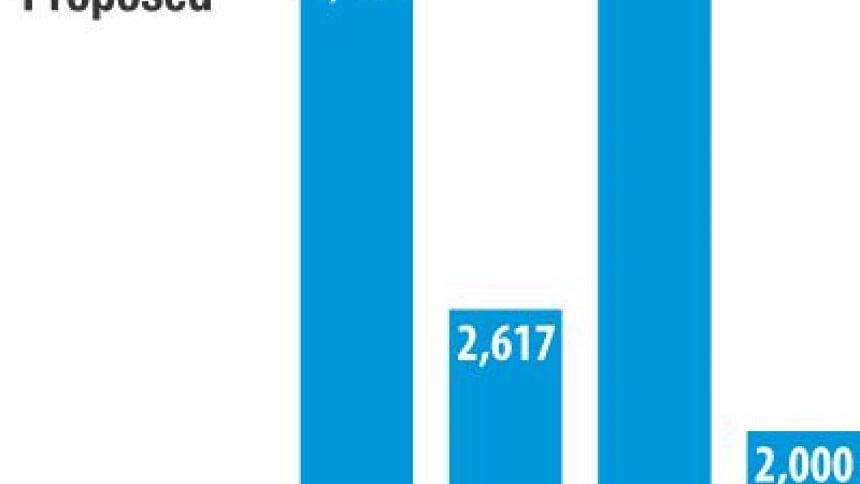Muhith to cut handouts for state banks by half

The allocation for state banks' recapitalisation is set to be slashed by more than half in the forthcoming budget -- the strongest indication yet of the government's intent to crack down on the lenders' errant ways.
Finance Minister AMA Muhith may keep aside about Tk 2,000 crore to meet the banks' capital deficit in the budget for fiscal 2016-17.
This fiscal year, Tk 5,000 crore was originally allocated for the purpose, but it was later reduced to Tk 1,800 crore in the revised budget. Scam-hit BASIC Bank got Tk 1,200 crore, with another Tk 300-400 crore likely on the way.
The development is a departure from the government's position on state banks, which have been handed huge sums for recapitalisation. Earlier this year, the banking division sought Tk 10,000 crore for the purpose for the next two fiscal years.
"The state banks would manoeuvre to make their financial conditions worse and the government would continue to give them funds from taxpayers' money -- things cannot go on like this," said a finance ministry official.
With the cut in allocation in the revised budget, the state banks have been given a warning that they would have to be self reliant, he said.
There are plans to bring in some reforms in state banks next year, the official said, with the government considering offloading some of its shares in the institutions.
Economists have already called for immediate privatisation of state banks save for Sonali and drastic measures against public enterprises to stop them from bleeding the economy.
"I think enough is enough. We no longer need state banks," said Mohammed Farashuddin, a former central bank governor, at a pre-budget discussion jointly organised by the Metropolitan Chamber of Commerce and Industry and Maasranga TV on May 15.
"We only need to keep Sonali Bank, which is our treasury bank. The other state banks should be left in the hands of people," he added.
Sadiq Ahmed, a member of the central bank's board of directors, unequivocally backed Farashuddin.
"Money is stolen from public banks and then taxpayers' money is used to save them -- I think it is a disastrous policy. This should not be tolerated any more."
Ahmed called for turning the state banks into narrow banks, if they are not privatised. Narrow banks can only take deposits; they cannot lend.
"If you can take away the lending decision, there will be no scope for misuse and abuse," he added.
On the proposal for privatising state banks except Sonali, Muhith said: "It's a good suggestion. We're already thinking about it, but we haven't taken any step in true sense. This proposal, however, encourages me to take it forward."
The World Bank in a report said unconditional recapitalisation provides no incentive for conducting deep surgery to repair the banks' damaged balance sheets.
The amount sought for recapitalisation in fiscal 2017-18 is nearly $1.3 billion, which is equivalent to 0.6 percent of fiscal 2014-15's gross domestic product. "This is a huge burden on the budget," said the Washington-based multilateral lender.
The banking and financial institutions division's annual performance agreement with the state banks should have specific targets linked to recapitalisation, it said.
Disbursement from the budgetary provisions for recapitalisation would take place upon achieving the targets.
Over the longer-term, rising stress in the state-owned banks will require more radical reforms in their structure of governance. "The fundamental problems with the state banks are the interdependence between banks and state-owned enterprises, the way that banks are run as SOEs, and the government's improper influences on the operations of SOEs and banks," the WB said.
Also, many private industrial companies have been hit by delays in making their investment projects operational due to unavailability of basic utility connections such as gas, water and electricity, leaving them unable to repay their loans to state banks. "Though these problems have been around for a long time and are deeply rooted, they have never really been solved." The banks' financial discipline was undermined by scams, high non-performing loans and inadequate capital followed by repeated recapitalisation, it added.
During the budget announcement for the current fiscal year last June, Muhith said a commission would be formed for the banking sector in fiscal 2015-16, whose major focus would be the state banks. The commission is yet to be formed, but the finance ministry official said it might take shape in fiscal 2016-17.

 For all latest news, follow The Daily Star's Google News channel.
For all latest news, follow The Daily Star's Google News channel. 



Comments